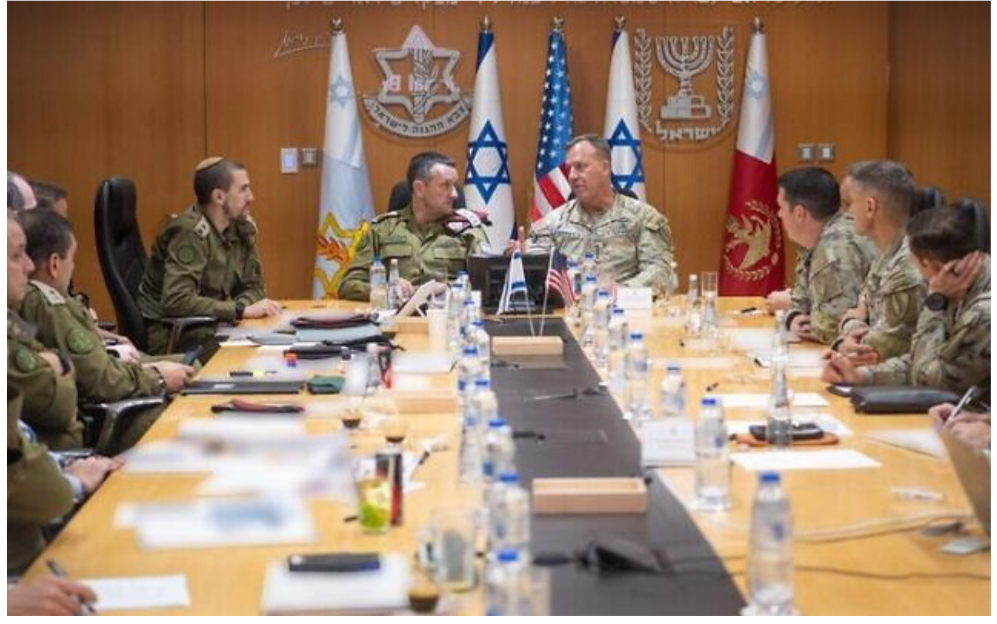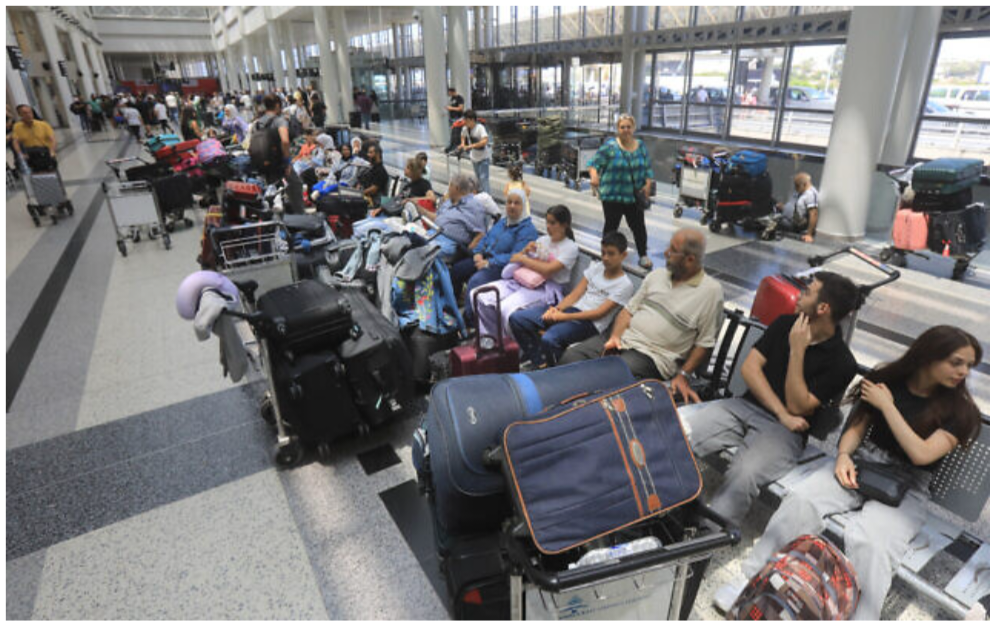Israeli Defense Minister Yoav Gallant (center) meets with IAF head Maj. Gen. Tomer Bar (left) and IAF chief of staff Brig. Gen. Omer Tischler (right) at the IAF’s underground command room in Tel Aviv, August 5, 2024. (Ariel Hermoni/ Defense Ministry.)
Defense Minister Yoav Gallant said Monday that the military must prepare a “quick transition to offense,” during a visit to the Israeli Air Force’s underground command center in Tel Aviv, amid heightened tensions over an anticipated Iranian and Hezbollah attack on the country.
“Our enemies are carefully considering their steps thanks to the abilities you have demonstrated in the last year. However, we must prepare for all possibilities, including a quick transition to offense,” Gallant said in remarks provided by his office.
Gallant observed the IAF’s preparations “in light of security developments” as well as “the possibilities of offensive action in all combat sectors,” the Defense Ministry said.
Gallant and IDF Chief of Staff Lt. Gen. Herzi Halevi, meanwhile, held assessments with United States CENTCOM chief Gen. Michael Kurilla, who arrived in Israel Monday as tensions spiraled.
The IDF said the meeting focused on “security-strategic issues and joint assessments in the region, as part of the response to threats in the Middle East.”
Separately, the chief of the IDF Northern Command told mayors and local council heads in northern Israel that the military’s offensive plans are ready for a potential escalated conflict with Hezbollah.
“I want you to know that our offensive plans going forward are ready and we are prepared for this, in all aspects, from me to every single one of the soldiers,” Maj. Gen. Ori Gordin told the mayors Sunday
“We’ve attacked and destroyed a lot in the last 10 months, but we still have work to do. We are determined and committed,” he added, according to remarks released by the IDF a day after the meeting.
Several reports have indicated that Iran and Hezbollah are likely to attack Israel in the coming days or weeks following last week’s back-to-back assassinations of Hezbollah military chief Fuad Shukr in Beirut by an Israeli strike and Hamas terror group leader Ismail Haniyeh in Tehran. Iran has blamed Israel for Haniyeh’s death and has vowed to retaliate.
In April, a massive drone and missile attack from Iran was foiled by a coalition made up of Israel, the United States, Britain, France, Qatar, Egypt, Jordan, Saudi Arabia, the United Arab Emirates, and Bahrain.
This time, however, Egypt informed a high-level Israeli delegation that visited Cairo on Saturday for indirect talks with American and Egyptian negotiators that it would not be part of a regional military coalition to repel a potential Iranian retaliatory attack against Israel, the Qatari-owned news outlet al-Araby al-Jadeed reported.
In an effort to maintain its neutrality and de-escalate tensions in the region sparked by the assassination of Haniyeh, Egypt also notified Tehran that it would close its airspace to any military action that would threaten regional security, the report said.
Iran, for its part, insisted Monday that it is not looking to escalate regional tensions, but believes it needs to “punish” Israel to prevent further instability.
The country’s Foreign Ministry also called in ambassadors and heads of missions residing in Tehran for a meeting with acting Foreign Minister Ali Bagheri Kani on Monday to reiterate Iran’s will to respond to Israel.
In Tehran’s Palestine Square, a banner was raised featuring an AI image of Israeli soldiers running in fear, reading in broken Hebrew, “You don’t have security, even in a bunker,” showing only male soldiers yet using the feminine conjunction. A Persian sentence read: “Smile for a while, because very soon you will cry.”
This AI-generated image of ???????? soldiers is currently on display in Palestine Square in Tehran right now.
In (grammatically incorrect) Hebrew, it warns that “you don’t have security, even in a bunker”.
Sorry, but an enemy that can’t even spell doesn’t strike fear into my heart. pic.twitter.com/i3IN8CP4G7
— Robbie Strazynski (@cardplayerlife) August 5, 2024
Iran tells pilots to avoid airspace
Meanwhile, in the lead-up to a potential attack, Iran told pilots and aviation authorities to avoid using its airspace, The Wall Street Journal reported. It also issued a notice to airlines, known as a NOTAM, warning of GPS disruptions over the country.
The significance of the disruptions was not immediately clear, nor who may be behind them, though GPS disruptions are sometimes used to confuse the targeting of precision-guided missiles.
Jordan also gave its own NOTAM, requesting that all airliners landing at its airports carry 45 minutes of reserve fuel, in what experts see as a precautionary measure in case of an attack by Iran against Israel.
In a bulletin, OPSGROUP, a membership-based organization that shares flight risk information, said the move was ahead of the anticipated closure of Jordanian airspace, a cautionary move in case of an attack on Israel by Iran.
“The Jordan NOTAM is relevant because in the April aerial attack on Israel, Jordan was the first country to close their airspace by NOTAM, well ahead of even Israel, Iran, or Iraq,” Mark Zee, OPSGROUP’s Chief Executive, told Reuters.

IDF Chief of Staff Lt. Gen. Herzi Halevi (center left) meets with United States CENTCOM chief Gen. Michael Kurilla (center right) in Tel Aviv on August 5, 2024 (IDF.)
“The 45 minutes would be intended to provide enough additional fuel for an aircraft to leave Jordanian airspace and land elsewhere,” he added.
Hospitals gather supplies as people pack Beirut Airport
Meanwhile, Lebanon on Monday received emergency medical supplies to equip its hospitals for possible war injuries and Beirut Airport was teeming with people trying to leave the country amid fears a full-scale conflict was on the horizon.
Hospitals in southern Lebanon, where most of the tit-for-tat exchanges between Hezbollah and the Israeli military have taken place, are worn down by a years-long economic meltdown and have struggled to cope with wounded patients over the last 10 months.
On Monday, the World Health Organization delivered 32 tons of medical supplies to Lebanon’s health ministry, including at least 1,000 trauma kits to treat possible war wounded.
“The goal is to get these supplies and medicines to various hospitals and to the health sector in Lebanon, especially in the places most exposed (to hostilities) so that we can be ready to deal with any emergency,” Health Minister Firass Abiad told reporters at the airport landing strip where the aid arrived.
In the airport’s departure hall, families of Lebanese origin who had come to their homeland for the summer lined up to check in to their departing flights, sad to be leaving earlier than expected.
Countries including France, Britain, Italy, Turkey, and others have urged their nationals to leave Lebanon as long as commercial flights are still available.
“It is just very sad, oh God, the situation is really sad. We get out of a crisis, we go into another one,” said Sherin Malah, a Lebanese citizen living in Italy who had come to Lebanon to visit her mother and was heading home early.
The United States has urged its citizens who want to leave Lebanon “to book any ticket available,” while the United Nations has asked the families of its staff to leave Lebanon and the Swedish embassy has temporarily relocated its staff to Cyprus.
But others in Lebanon appeared more relaxed. Along the sandy coastline of Lebanon’s port city of Tyre, about 20 km (12 miles) from the border with Israel, children splashed in the water as plumes of black smoke from Israeli shelling further south curled up from the hills behind them.
“As for the current situation, as you can see, all the people are by the beach, this land is our land, and we will not leave it,” said Tyre resident Ghalib Badawy.
While tensions ramped up considerably following the assassination of Shukr and Haniyeh, the region has already been in turmoil since October 7, when Hamas launched an unprecedented cross-border attack on Israel in which terrorists killed some 1,200 people and took 251 hostages, sparking the ongoing war in Gaza.

People await their flights at the Beirut International Airport departure hall on August 5, 2024.

